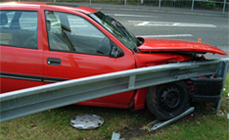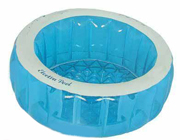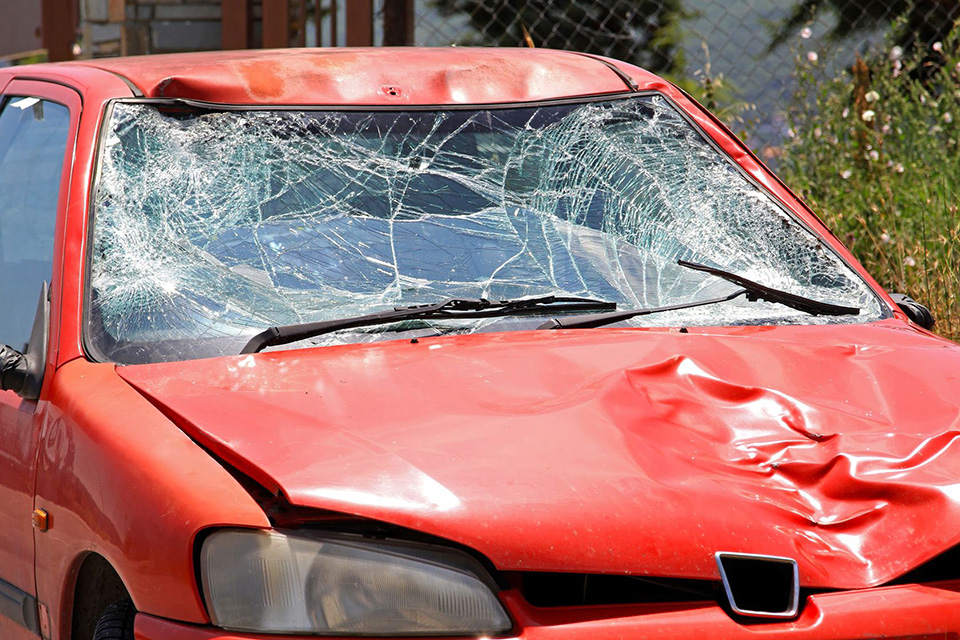Personal Injury
Surgical Mesh To Be Reviewed By FDA Sept. 8-9
Following thousands of reports about serious injuries among women, a Food and Drug Administration (FDA) panel will begin examining the safety of surgical mesh on Sept. 8 and 9.
Surgical mesh is implanted during transvaginal mesh surgery, the treatment for Pelvic Organ Prolapse (POP) and Stress Urinary Incontinence (SUI). The procedure is performed to repair weak or stretched vaginal tissue, often after childbirth.
The panel’s review comes almost two months after the FDA’s July 13 public safety advisory on surgical mesh and as special interests step into the debate about a possible surgical mesh recall.
In the July 13 advisory, the FDA said transvaginal POP repair with mesh has no advantage over traditional non-mesh repair. The FDA’s finding was based on a review of scientific literature published between 2006 and 2011.
Between 2005 and 2010, more than 3,800 women had reported complications and injuries following transvaginal mesh surgery, according to the FDA.
The most prevalent complaint was mesh erosion within the body, but other injuries included bleeding, pain during sexual intercourse, organ perforation, vaginal scarring, muscular and emotional problems. Remedies include corrective surgery, hospitalization and intensive follow-up medical treatment.
On August 25, 2011, Public Citizen, a Washington D.C.-based consumer advocacy group, called for a recall of all non-absorbable synthetic material used in transvaginal mesh surgery. It also wants a reclassification of the approval process for new surgical mesh products.
The same day, a coalition of 600 pelvic surgeons submitted the FDA a letter challenging its findings about the risk for complications during transvaginal mesh surgery. The letter was obtained by the CommonHealth medical website. Among their challenges, the surgeons argued mesh erosion is not a major complication.
In 2010, approximately 300,000 women in the U.S. had surgery to repair POP, including 75,000 of whom had surgical mesh transvaginally implanted, according to the FDA.
Nine companies manufacture transvaginal mesh products, including Boston Scientific and Johnson & Johnson. Bloomberg News reported one recommendation from the FDA staff administration would require the manufacturers to submit additional safety data to regulators.
The FDA cleared 85 mesh devices to treat pelvic organ prolapse from 1992 to 2010.
Read More
Massachusetts Car Insurance Tips for College Students
 Each September, thousands of college students in Boston, Cambridge and across Massachusetts settle into campus life. And many students enjoy the extra freedom of bringing a car from home to school.
Each September, thousands of college students in Boston, Cambridge and across Massachusetts settle into campus life. And many students enjoy the extra freedom of bringing a car from home to school.
But students often make one costly mistake in the transition to college life. Students who have Massachusetts car insurance policies are required to inform their insurance companies about where the car is primarily kept. Otherwise, if there is a car accident, the insurance company might disclaim coverage, leaving the accident underinsured or uninsured completely. Students who fail to report their change of address and get into a car accident can be denied the Optional Insurance coverages on their policy.
Even if a student relocates a short distance, such as from Dedham to a dorm in Boston, he or she must inform the car insurance company where the vehicle will now be kept. The reason? Car insurance companies rate the coverage — and therefore the cost — on where the car is principally kept. If the car moves from a low-rated area (with fewer accidents) to a higher-rated area, the cost goes up. And if you are not paying the premium for the place where the car is principally kept, the insurance company has the legal right to disclaim coverage. And that can be harsh.
Optional Insurance Coverages Potentially At Risk Include:
Bodily Injury: This protects you from claims against your personal property if you cause a serious car accident.
Uninsured Auto: This coverage protects you and the people in your car if the person who causes the motor vehicle accident has no insurance.
Medical Payments: The first $8,000 in medical bills and lost wages are covered under the Personal Injury Protection (PIP), part of the Compulsory Coverage all Massachusetts drivers must purchase. Medical Payments provides policy holders extra protection for medical and health insurance.
Collision Comprehensive: If you are involved in a car accident, this coverage insures the damage to your vehicle.
Insurance issues can be very complicated, and you should not hesitate to call your agent if you have any questions.
Click here to read our article, “Understanding and Buying Massachusetts Car Accident Insurance.”
Another resource is, “Frequently Asked Questions on Auto Insurance,” by the Massachusetts Consumer Affairs and Business Regulation office.
Massachusetts Safety Tips After Tropical Storm Irene
 Now that Tropical Storm Irene has passed, residents and businesses throughout Massachusetts have started the extensive clean-up. Many remain without power.
Now that Tropical Storm Irene has passed, residents and businesses throughout Massachusetts have started the extensive clean-up. Many remain without power.
An estimated 4.5 million homes and businesses along the East Coast lost power, including 700,000 in Massachusetts, officials reported. Utility and state officials estimate it may take several days to restore power in some communities.
The storm caused 26 deaths across the country. In Massachusetts, a public works employee on his way to join recovery efforts was electrocuted Monday by a downed power line outside his Southbridge home.
From Storrow Drive in Boston to Interstate 91 in western Massachusetts, many roads were shut down by flooding. Residents in several communities were evacuated from their homes, including in several western Massachusetts towns, Southboro and New Bedford,
Whether you are cleaning up your yard, driving or waiting for power to be restored, it is essential to think safety for you, your family and property. Here are safety tips from the Boston personal injury lawyers at Breakstone, White & Gluck:
- Be prepared for intersections without working traffic lights or police officers to direct cars.
- When driving, travel farther behind the vehicle in front of you than normal. Road detours and single-lane roads may not be visible until just before you reach them.
- Give even more room when traveling behind tractor trailers carrying heavy loads of branches and storm debris.
- If your home is still without power, make sure you have enough flashlights and plenty of extra batteries. Avoid using candles.
- Natural gas or propane valves that have been under water should be replaced. Smell and listen for leaky gas connections that may trigger an explosion.
- If you believe there has been a gas leak, there is risk for a home explosion. Immediately leave the house, leave the doors open and contact a gas system professional before you return.
- Take measures to avoid food poisoning. Throw away any refrigerated foods that are held at above 40 degrees for more than two hours. Food can generally keep for up to 4 hours in a refrigerator that is not opened and between 24 to 48 hours in a freezer.
- Watch news reports to see if your local health department has cleared tap water for safe consumption. If you are without power and cannot watch television or access the Internet, call your town or city hall to ask.
- Watch out for and stay away from downed power lines.
- Do not enter and avoid walking near damaged buildings.
- Be careful walking under trees as there may be loose branches.
Cambridge and Somerville Ranked Among Top U.S. Cycling Cities
 Local cyclists have long known Cambridge and Somerville offer some of the best riding in Greater Boston. But a popular website now says they are among the foremost biking destinations in the nation.
Local cyclists have long known Cambridge and Somerville offer some of the best riding in Greater Boston. But a popular website now says they are among the foremost biking destinations in the nation.
The Street.com recently released its 10 Best U.S. Bike Cities of 2011 list, naming Cambridge the fifth best bicycling city and Somerville the ninth. Boulder, Colorado was the leader.
Cambridge was praised for the strong network of bicycle lanes and shared lane space along the Massachusetts institute of Technology (MIT) campus and nearby technology companies, such as Genzyme, Sanofi Aventies, Biogen Idec and Akamai.
Cambridge bicyclists make up 8.5 percent of the city’s population. The city has several bike shops. Cambridge Police are active in educating the public about taking steps to prevent bicycle accidents. The Cambridge Bicycle Committee has been working to improve safety conditions and reduce bike accidents since 1991.
Somerville was recognized for its bicycling infrastructure and the strong community support for bicyclists. Some 5 percent of the city’s residents are cyclists. Many riders are college students, who account for 16 percent of the population. The city neighbors Medford, home to Tufts University, and Cambridge, where Harvard University, MIT, Leslie University and Cambridge College are all based.
Somerville was praised for its “walkable, accessible squares,” and bicycle-friendly businesses, which offer Tour de France specials, bicycle valet services and benefits for local bike groups. Businesses also host an annual bike party that shuts down a portion of Davis Square.
Somerville has several bike shops and formed the Somerville Bicycle Committee in 2001. The committee has overseen development of new bike lanes, sharrows and multi-use paths to prevent bicycling accidents and personal injuries. It has also guided the development of on-street bike parking in corrals and the ongoing installation of bike racks.
To read the 10 Best U.S. Bike Cities of 2011 report, click here.
Click here to learn more about Massachusetts bicycling laws.
Read More
Drive Safe in August as Motor Vehicle Accidents Rise
 You may think winter snowfall makes for treacherous driving. But government figures show August is actually the most dangerous month on the roads, making it an important time to take precautions.
You may think winter snowfall makes for treacherous driving. But government figures show August is actually the most dangerous month on the roads, making it an important time to take precautions.
Based on records dating back to 1994, the National Highway Traffic Safety Administration (NHTSA) reports more Americans die in car crashes in August than at any other time of the year. In August 2009, that number totaled 2,864 deaths.
September had the next highest rate of traffic fatalities, followed by July. Weekends are the deadliest time on the roads throughout the year. Nationwide in 2009, there were an average of 123 deaths each day on Saturdays and 107 deaths on Sunday.
Experts say motor vehicle deaths rise in August because more people are on the road traveling for vacation, taking day trips and attending summer events.
Because of these factors, it is paramount to practice safe driving. Here, our Massachusetts personal injury lawyers offer safety tips to protect you and your family:
- Do not drink and drive.
- Travel slowly at night and make sure you are familiar with your route.
- Reduce distractions by putting away your cell phone and GPS.
- When traveling with children, explain you must concentrate on the road.
- On the highway, make sure children have distractions such as books and games.
- Never leave a child unattended in a vehicle.
- Wear your seat belt.
- Do not speed.
- Talk to teenagers about taking safety precautions such as limiting passengers and avoiding night driving.
FDA Issues Warning About Transvaginal Mesh Surgery
The Food and Drug Administration (FDA) has issued a public notice on transvaginal mesh surgery after receiving thousands of reports about harmful complications. The notice advised patients and healthcare providers to consider alternatives to mesh surgery. The FDA has not issued a product recall, but will convene a panel this fall to make recommendations for the procedure.
Transvaginal mesh is a medical device implanted surgically to treat Pelvic Organ Prolapse (POP) and Stress Urinary Incontinence (SUI). These conditions can emerge after childbirth and pregnancy. POP occurs when organs bulge into the vaginal and bladder areas. SUI is a loss of bladder control.
Over 1,000 adverse events involving transvaginal mesh devices were reported to the FDA between 2005 and 2007. On October 20, 2008, the FDA issued a Public Health Notification reporting the figures. From January 2008 to December 31, 2010, there were an additional 2,874 reports of complications.
From 2006 to 2011, the FDA conducted a systematic review of published scientific literature and reported transvaginal POP repair with mesh has no advantage over traditional non-mesh repair. The FDA is advising health care providers to only choose mesh surgery after carefully comparing the risks and benefits with other surgical options.
The most frequent complications associated with transvaginal mesh surgery is erosion throughout the vagina, pain, infection, bleeding, pain during sexual intercourse, organ perforation and urinary problems. There were also reports of emotional problems, vaginal scarring and neurovascular muscular problems.
Many of these conditions involve painful remedies, including medical treatment, several surgeries and hospitalization.
Several companies manufacture transvaginal mesh, including Johnson & Johnson and Boston Scientific, C.R. Bard, Tyco Covidian and AMS. Injuries have not been linked to a single brand of mesh.
If you have been injured by a transvaginal mesh repair, you may be entitled to compensation. It is important to speak to an experienced product liability lawyer as soon as possible so you can obtain the proper medical attention and compensation for your injuries, loss of time at work and pain and suffering.
For a free legal consultation, contact the experienced Boston product liability lawyers at Breakstone, White & Gluck today. Call us at 800-379-1244 or use our contact form.
Read More
Head Injury Guidelines Begin for Student-Athletes This Fall
 Student-athletes in Massachusetts will add a new drill to their warm ups this fall: concussion training aimed at preventing deaths, long-term injuries and disabilities.
Student-athletes in Massachusetts will add a new drill to their warm ups this fall: concussion training aimed at preventing deaths, long-term injuries and disabilities.
In 2010, the state Legislature passed a law requiring training and education for anyone involved in public middle school and high school sports. The Department of Public Health issued guidelines in June detailing the requirements, which include:
- Parents, players, coaches, school nurses, volunteers and others involved in sports must participate in annual state-approved training on how to recognize the symptoms of concussions.
- Schools have a few options for fulfilling the training requirement, including offering training materials at parent meetings and online trainings from the Centers for Disease Control and Prevention and the National Federation of State High School Associations.
- Student-athletes who suffer a head injury must be immediately removed from play and get medical clearance before returning.
- Student-athletes diagnosed with a concussion must have a written plan for returning to the game and the classroom.
- Student-athletes with a history of head injuries must file an injury report before every season.
Across the country, an estimated 136,000 student-athletes suffer concussions in high school sports each year.
Concussions are often referred to as a “metabolic cascade,” a series of changes in which the brain’s nerve cells stop functioning properly and blood flow slows down.
Concussions can occur when athletes collide with other players, equipment or the ground. It is important for people who suffer concussions to reduce physical and cognitive activity. When there is a subsequent injury, concussions can be fatal and result in long term injuries impacting memory, mood and impulses.
Concussions can be difficult to diagnose in part because the effects are not visible on imaging tools such as CT scans or MRIs.
Massachusetts schools are making changes as awareness about concussions increases throughout the sports and medical community. Starting this fall, Ivy League football players are limited to suiting up for two full-contact practices each week. The pending contract agreement will implement new guidelines for National Football League (NFL) players as well.
For more information, click to read this article in The Boston Globe.
Read More
Defective Toy Truck Recalled by Fisher-Price
 Fisher-Price has recalled a popular toy truck after its plastic handle has been found to pose a laceration risk.
Fisher-Price has recalled a popular toy truck after its plastic handle has been found to pose a laceration risk.
The East Aurora, New York toymaker recalled its Little People® Builders’ Load ‘n Go Wagon in cooperation with the U.S. Consumer Product Safety Commission (CPSC) and Health Canada this week. About 208,000 defective toy trucks were recalled in the United States and 2,800 in Canada. The toy trucks were sold in mass merchandise retail stores nationwide from June 2009 through July 2011 for about $25. They were manufactured in Mexico.
The toy truck is being recalled because its plastic handle has molded-in reinforcement. If a child falls on it, he could suffer a laceration.
The CPSC and Fisher-Price are aware of seven reports of personal injuries. Five reports came from children requiring surgical glue or stitches.
Consumers affected by the Fisher-Price recall can call 800-432-5437 or visit www.service.mattel.com for a free repair kit. The recall involves the wagon with the model number P8977. More information is available on the Mattel website.
Product recalls and deaths related to unsafe toys have declined in recent years, but toy-related injuries have been increasing. In 2009, 186,000 children under 15 were treated for toy-related injuries in emergency rooms, up from 152,000 in 2005.
In 2009, 12 children under 15 suffered wrongful deaths involving defective toys, a 50 percent decrease over the two prior years. Meanwhile, in 2010 there were 44 toy recalls, a significant drop from 172 in 2008.
The CPSC offers a few tips for parents: purchase age-appropriate toys, include safety gear whenever you buy sports equipment and ride-on toys and always be aware of your child’s location during play. Parents should also closely inspect toys prior to giving them to children.
Read More
Study: One Child Dies in Portable Pools Every Five Days
 A surprising study published last month revealed that one child in the U.S. dies every five days in portable swimming pools during the warm weather months.
A surprising study published last month revealed that one child in the U.S. dies every five days in portable swimming pools during the warm weather months.
The study published in the journal Pediatrics challenges the popular idea that in-ground swimming pools pose a much larger safety risk. This study is significant because drowning has become the second leading cause of death among children age one to 14, according to the Centers for Disease Control and Prevention.
The study reports 209 deaths and 35 near-drownings of children under 12 in portable pools from 2001 through 2009. More than 90 percent of the children were under 5 and 81 percent of the swimming pool accidents occurred during the summer months.
The study’s classification of portable pools includes small wading pools less than 18 inches deep, inflatable pools and other soft-sided pools up to four feet deep. The study was conducted by National Hospital and Independent Safety Consulting in Rockville, Maryland. Researchers say the findings are comparable to in-ground pool drownings.
Researchers say owners of portable pools often fail to take the same safety precautions as those who own in-ground pools. They set pools up quickly without taking the time to install fencing, pool alarms, safety covers and lockable ladders.
The numbers also show in many cases, children are swimming in portable pools without adult supervision. Children were supervised by parents in only 43 percent of the drownings and swimming pool accidents. Parents were home 73 percent of the time.
Read more about the study published in Pediatrics. Read More
Food Poisoning Warning for Fourth of July Cookouts
 The Fourth of July is for outdoor family barbecues. But enjoying food safely in the warm weather requires planning. Each year, 48 million Americans are sickened by food poisoning – or one in six, according to the Centers for Disease Control. Of these, 180,000 are hospitalized and 3,000 die. The good news is food poisoning is preventable. If you are grilling for family and friends this holiday weekend, follow these few easy guidelines to keep your meal safe:
The Fourth of July is for outdoor family barbecues. But enjoying food safely in the warm weather requires planning. Each year, 48 million Americans are sickened by food poisoning – or one in six, according to the Centers for Disease Control. Of these, 180,000 are hospitalized and 3,000 die. The good news is food poisoning is preventable. If you are grilling for family and friends this holiday weekend, follow these few easy guidelines to keep your meal safe:
- Wash your hands thoroughly with soap and water before and after handling food. Washing hands afterward is just as important to prevent food poisoning.
- Make hand soap accessible indoors. Outdoors, keep hand sanitizer near your food. Encourage everyone cooking and eating to use it.
- Limit the amount of time food is left outside, especially mayonnaise-based salads.
- Marinate meats and other foods in the refrigerator, never on the counter.
- Never reuse sauce used to marinate raw meat, poultry or seafood. If you want to use the sauce in another way, set aside a separate portion before marinating.
- Use a food thermometer to make sure food is cooked thoroughly. Refer to the Safe Minimum Temperatures Chart for safe internal temperatures.
- Serve food at a safe temperature. Keep hot food at 140 degrees Fahrenheit or above until served. Serve cold food at 40 degrees Fahrenheit.
- Make sure to keep plenty of ice and coolers on hand. Maintain one cooler for beverages and one for raw meats, poultry and seafood. Keep a third cooler for cooked foods and raw fruits and vegetables.


